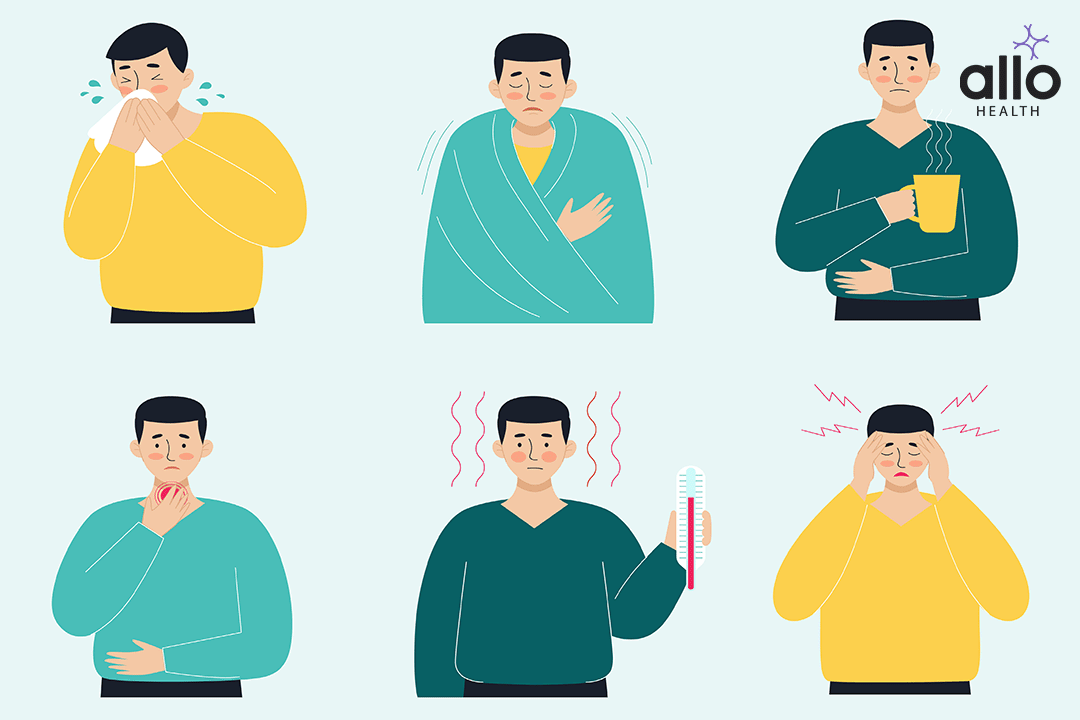Using Amoxicillin for Cough Treatment: Benefits and Risks

Allo Health is dedicated to personalized well-being, offering support and trusted information tailored to individual health goals. The platform emphasizes human-generated content, led by a distinguished medical team of experts, including physicians and sexual health specialists. Their commitment to credibility involves rigorous fact-checking, authoritative research, and continuous updates to ensure accurate, up-to-date information. Allo Health's unique approach goes beyond conventional platforms, providing expert-led insights and a continuous commitment to excellence, with user feedback playing a crucial role in shaping the platform's authoritative voice.

Dr Sanina Mansoor holds MBBS degree from Yenepoya university,Mangalore.She has 8 years of experience working as a medical officer at various health centres and medical colleges.
Why This Was Upated?
Our experts continually monitor the health and wellness space, and we update our articles when new information became available.
Updated on 11 December, 2023
- Article was updated as part of our commitment to diversity, equity, and inclusion.

"The following blog article may discuss medical treatments and interventions. However, it is important to note that the information provided is for general educational purposes only and should not be considered as a substitute for professional medical advice, diagnosis, or treatment. Always seek the guidance of a qualified healthcare professional for personalized medical advice.
Book consultation
Medical treatments are complex and should be tailored to individual circumstances. The information presented in this blog may not be applicable to everyone, as each person's medical condition, history, and needs are unique. Only a qualified healthcare professional can evaluate your specific medical situation, consider relevant factors, and provide appropriate recommendations for diagnosis, treatment options, and monitoring.
It is crucial to note that self-diagnosis, self-medication, or relying solely on the information provided in this blog for treatment decisions can have serious health consequences. "
Coughing is a common symptom of a variety of illnesses, such as the flu, pneumonia, and bronchitis. The discomfort, pain, and irritation caused by coughing can make even the most simple tasks difficult. Amoxicillin is a commonly prescribed antibiotic used to treat coughs, but there are pros and cons to using it. This article aims to be an exhaustive guide to amoxicillin and its effectiveness in treating coughs.
What Is Amoxicillin?
Amoxicillin is a widely used prescription antibiotic in the penicillin class of drugs. It is used to treat a variety of bacterial infections, including those of the ear, nose, throat, respiratory tract, skin, and urinary tract. Amoxicillin works by stopping the growth of bacteria.
Chemical Structure:
Amoxicillin belongs to the beta-lactam class of antibiotics and is structurally similar to penicillin. It contains a beta-lactam ring and a thiazolidine ring.
Mechanism of Action:
Amoxicillin inhibits the synthesis of bacterial cell walls by interfering with the cross-linking of peptidoglycan chains. Bacterial cell walls are essential for their survival, and by disrupting this process, amoxicillin weakens the bacterial cell wall, leading to the death of the bacteria.
Indications:
Amoxicillin is commonly prescribed to treat various bacterial infections, including:
- Respiratory Tract Infections: Such as pneumonia, bronchitis, and sinusitis.
- Ear Infections: Including otitis media.
- Throat Infections: Such as strep throat.
- Skin Infections: Such as cellulitis.
- Urinary Tract Infections (UTIs): Including cystitis.
Dosage:
Dosage of amoxicillin depends on the type and severity of the infection, as well as the patient’s age and overall health. It is typically taken orally, with or without food.
Side Effects:
Common side effects of amoxicillin include nausea, vomiting, diarrhea, and rash. Severe allergic reactions (such as anaphylaxis) are rare but can be life-threatening. It’s crucial to seek medical attention if you experience difficulty breathing, swelling of the face/tongue/throat, severe dizziness, or rash.
Precautions and Interactions:
- Allergies: Individuals with known allergies to penicillin or other beta-lactam antibiotics should avoid amoxicillin.
- Pregnancy and Breastfeeding: Amoxicillin is generally considered safe for pregnant and breastfeeding women, but it should be used under a doctor’s supervision.
- Drug Interactions: Amoxicillin can interact with certain medications, so it’s essential to inform your healthcare provider about all the drugs you are taking.
Completing the Course:
It’s crucial to finish the prescribed course of amoxicillin, even if symptoms improve before the medication is gone. Stopping the antibiotic too early can allow bacteria to continue to grow, which may result in a relapse of the infection.
Amoxicillin is a vital and commonly prescribed antibiotic used to treat a range of bacterial infections. Like all medications, it should be taken as prescribed and under the supervision of a healthcare provider to ensure its effectiveness and minimize the risk of side effects or complications. If you are prescribed amoxicillin, it’s important to follow your healthcare provider’s instructions and ask any questions you may have about the medication.
Amoxicillin Uses & Benefits
Treatment of Bacterial Infections:
Amoxicillin is highly effective against a wide range of bacterial infections caused by susceptible strains of bacteria. These include respiratory tract infections (such as pneumonia, bronchitis, and sinusitis), ear infections (otitis media), throat infections (including strep throat), skin and soft tissue infections, urinary tract infections (UTIs), and certain types of stomach ulcers caused by the bacteria Helicobacter pylori.
Dental Infections:
Amoxicillin is sometimes used in dental procedures to prevent infections, especially if a person has a heart condition or a weakened immune system, which could make them susceptible to bacterial infections after dental work.
Prophylaxis (Preventive Treatment):
In certain cases, amoxicillin is given to individuals with specific heart conditions before dental work or surgery to prevent bacterial endocarditis, a serious heart infection.
Lyme Disease:
Amoxicillin is often prescribed to treat early-stage Lyme disease, particularly in children and pregnant or breastfeeding women.
Benefits and Advantages:
- Broad-Spectrum Activity: Amoxicillin is effective against a wide variety of bacteria. It belongs to the penicillin class of antibiotics and is a broad-spectrum antibiotic, meaning it can target a large number of different types of bacteria.
- Well-Tolerated: For many people, amoxicillin is well-tolerated and causes few side effects. It is often prescribed to children because it is available in a liquid form, making it easier for them to take.
- Cost-Effective: Amoxicillin is relatively inexpensive compared to some other antibiotics, making it accessible to a wide range of patients.
- Rapid Onset of Action: It starts working relatively quickly after ingestion, which can help in providing relief from symptoms sooner.
- Widely Prescribed: Amoxicillin has been used for decades and is one of the most commonly prescribed antibiotics worldwide due to its effectiveness and safety profile.
Combination Therapy:
In some cases, amoxicillin is used in combination with other antibiotics to enhance its effectiveness or to combat bacteria that have developed resistance to amoxicillin alone.
Pediatric Use:
Amoxicillin is commonly prescribed for children because of its effectiveness and the availability of child-friendly formulations. Proper dosing is essential in pediatric cases to ensure its efficacy.
Prevention of Mother-to-Child Transmission:
In some cases, pregnant women with certain infections, such as group B Streptococcus, may be given amoxicillin to prevent transmitting the infection to the newborn during childbirth.
Amoxicillin’s versatility, effectiveness against a broad spectrum of bacteria, and relatively low cost make it a popular choice for healthcare providers in the treatment of various bacterial infections. However, it is essential to use antibiotics responsibly, following medical advice and completing the full prescribed course to prevent antibiotic resistance and ensure the best possible outcomes for patients.

Amoxicillin Precautions
Allergy and Hypersensitivity:
Amoxicillin is a penicillin-type antibiotic. If you have a known allergy to penicillin or other beta-lactam antibiotics (such as cephalosporins), inform your healthcare provider before taking amoxicillin. Allergic reactions can range from mild rashes and itching to severe reactions, including anaphylaxis, which can be life-threatening.
Inform Your Healthcare Provider:
Before starting amoxicillin, inform your healthcare provider about your medical history, especially if you have or have had liver or kidney disease, mononucleosis (mono), allergies, asthma, or a history of diarrhea caused by taking antibiotics.
Pregnancy and Breastfeeding:
Amoxicillin is generally considered safe to use during pregnancy. However, always inform your doctor if you are pregnant, planning to become pregnant, or breastfeeding. Your healthcare provider will weigh the benefits against the potential risks.
Drug Interactions:
Certain medications can interact with amoxicillin, altering its effectiveness or increasing the risk of side effects. Make sure your healthcare provider is aware of all the medications, supplements, and herbal products you are taking. Common interactions can occur with allopurinol, probenecid, and some oral contraceptives.
Diarrhea:
Amoxicillin may cause diarrhea, which could be a sign of a new infection. If you experience severe or persistent diarrhea, abdominal or stomach pain/cramping, or blood/mucus in your stool, contact your doctor immediately. Do not use anti-diarrheal medications without your healthcare provider’s approval.
Clostridium difficile Infection:
Amoxicillin can lead to an overgrowth of Clostridium difficile, a bacteria that causes severe diarrhea. This condition can range from mild to life-threatening. Inform your doctor immediately if you develop persistent diarrhea, abdominal or stomach pain, or blood or mucus in your stool during or after your treatment.
Resistance and Incomplete Treatment:
Antibiotic resistance is a significant concern. It’s crucial to complete the entire prescribed course of amoxicillin, even if your symptoms improve before the medication is finished. Stopping the antibiotic too early may not completely eliminate the bacteria, allowing them to become resistant to future treatments.
Impact on Birth Control Pills:
Amoxicillin can affect the efficacy of birth control pills. It’s recommended to use additional contraceptive methods (such as condoms) while taking amoxicillin and for a few days after completing the course.
Alcohol Interaction:
While there is no specific interaction between amoxicillin and alcohol, it’s generally advisable to avoid alcohol while you are unwell and taking any medication. Alcohol can interfere with your body’s ability to heal and might amplify the side effects of certain medications.
Always follow your healthcare provider’s instructions and inform them about your medical history and any medications you are taking. Being aware of these precautions can help ensure safe and effective use of amoxicillin and minimize the risk of adverse reactions. If you have any concerns or experience unusual symptoms while taking amoxicillin, contact your healthcare provider promptly.
Amoxicillin Side Effects
Amoxicillin, like any medication, can cause side effects. While many people tolerate it well, some individuals may experience adverse reactions. It’s important to note that not everyone will experience these side effects, and some effects may be rare. Here is a detailed list of potential side effects associated with amoxicillin:
Common Side Effects:
- Nausea and Vomiting: Nausea is a common side effect of amoxicillin and may be accompanied by vomiting.
- Diarrhea: Diarrhea is another common side effect, often occurring due to the disruption of normal gut bacteria.
- Stomach Pain or Cramps: Some people experience abdominal discomfort while taking amoxicillin.
- Skin Rash: A mild rash is a common reaction. If the rash is severe, involves blistering, or is accompanied by other symptoms like fever, it could be a sign of an allergic reaction.
- Oral Thrush: Amoxicillin can disrupt the natural balance of microorganisms in the mouth, leading to oral yeast infections (thrush).
- Vaginal Yeast Infections: Similar to oral thrush, amoxicillin can also lead to yeast infections in women.
Less Common Side Effects:
- Headache: Some individuals may experience headaches while taking amoxicillin.
- Dizziness: Dizziness or lightheadedness can occur in some cases.
- Fatigue: Feeling unusually tired or weak might be a side effect.
- Loss of Appetite: Some people may experience a decreased desire to eat.
- Joint Pain: Joint pain or inflammation is a less common side effect.
Serious Side Effects (Rare, but Seek Immediate Medical Attention):
- Allergic Reactions: Severe allergic reactions to amoxicillin can cause difficulty breathing, swelling of the face, lips, tongue, or throat, and severe skin rash. This requires emergency medical attention.
- Watery or Bloody Diarrhea: This could be a sign of a serious intestinal condition and requires immediate medical attention.
- Severe Skin Reactions: Rarely, amoxicillin can cause severe skin reactions like Stevens-Johnson syndrome, characterized by blistering and peeling of the skin. This is a medical emergency.
- Liver Concerns: Symptoms can include persistent nausea/vomiting, severe stomach/abdominal pain, yellowing eyes/skin, and dark urine.
- Kidney Concerns: Signs include changes in the amount of urine, confusion, or easy bruising/bleeding.
Other Considerations:
- Superinfection: Prolonged use of amoxicillin can result in overgrowth of Non susceptible bacteria or fungi, leading to a secondary infection.
- Clostridium difficile-Associated Diarrhea: Amoxicillin can disrupt the normal gut flora, leading to C. difficile overgrowth and causing severe diarrhea.
It’s essential to be aware of these potential side effects while taking amoxicillin. If you experience any unusual or severe symptoms, contact your healthcare provider immediately. Always take the medication exactly as prescribed, and do not hesitate to consult your healthcare provider or pharmacist if you have concerns about the side effects you are experiencing.
Amoxicillin Drug Interactions
Amoxicillin can interact with various drugs and substances, potentially affecting its effectiveness or increasing the risk of side effects. It’s crucial to inform your healthcare provider about all the medications, supplements, and herbal products you are taking before starting amoxicillin. Here is a detailed list of some common drug interactions with amoxicillin:
Probenecid and Allopurinol:
These medications can interfere with the renal tubular secretion of amoxicillin, potentially increasing its blood levels. This interaction might require a dosage adjustment.
Methotrexate:
Amoxicillin can decrease the excretion of methotrexate, leading to elevated methotrexate levels in the body. This can increase the risk of methotrexate toxicity. If you are taking methotrexate, your healthcare provider may need to monitor your methotrexate levels closely.
Oral Contraceptives:
Amoxicillin can reduce the effectiveness of birth control pills. It is recommended to use additional contraceptive methods, such as condoms, during amoxicillin therapy and for a few days after completing the course to prevent unintended pregnancies.
Anticoagulants (Blood Thinners):
Amoxicillin can enhance the anticoagulant effects of drugs like warfarin. If you are taking blood thinners, your healthcare provider may need to monitor your blood clotting time more frequently.
Aminoglycosides (e.g., Gentamicin):
Amoxicillin can potentiate the effects of certain aminoglycoside antibiotics. Your healthcare provider will carefully monitor your kidney function and adjust dosages accordingly if these medications are co-administered.
Certain Vaccines:
Amoxicillin can interfere with the effectiveness of live bacterial vaccines (such as typhoid vaccine). It’s advisable to complete your vaccine schedule before starting amoxicillin or consult your healthcare provider about appropriate vaccination timing.
Antacids, Iron Supplements, Calcium Supplements, and Magnesium-based Antacids:
These products can bind to amoxicillin, reducing its absorption. If you need to take antacids or supplements, it’s recommended to take them at least 2 hours before or after taking amoxicillin.
Proton Pump Inhibitors (PPIs) and H2 Blockers:
These medications, used to treat stomach acid-related conditions, can reduce the absorption of amoxicillin. It’s advisable to consult your healthcare provider about the appropriate timing of these medications if you are prescribed amoxicillin.
Urinary Glucose Tests:
Amoxicillin may cause false positive results in certain urine glucose tests. If you are diabetic and using urine glucose tests, inform your healthcare provider or pharmacist that you are taking amoxicillin.
Understanding these potential interactions is essential to ensure the safe and effective use of amoxicillin. Always provide a comprehensive list of your medications and supplements to your healthcare provider before starting any new medication, including antibiotics like amoxicillin. They can make appropriate adjustments to your treatment plan to minimize the risk of interactions and ensure your overall safety.
Using Amoxicillin for Cough Treatment: Benefits and Risks

Using amoxicillin for cough treatment is a topic that requires careful consideration. Coughs can be caused by various factors, including infections, allergies, asthma, or environmental irritants. Amoxicillin is an antibiotic used to treat bacterial infections, but most coughs are caused by viral infections, which do not respond to antibiotics. Here’s a detailed breakdown of the benefits and risks associated with using amoxicillin for cough treatment:
Benefits:
- Bacterial Infections: If a cough is caused by a bacterial infection such as bronchitis or pneumonia, amoxicillin can be effective. Bacterial pneumonia, for instance, is a severe lung infection that may require antibiotic treatment.
- Secondary Infections: Sometimes, a viral infection like the flu or a cold can weaken the immune system and lead to secondary bacterial infections. In such cases, amoxicillin might be prescribed to treat the bacterial infection.
- Preventing Complications: Treating bacterial infections promptly with amoxicillin can prevent complications and the spread of the infection to other parts of the respiratory system.
Risks and Considerations:
- Viral Infections: The majority of coughs are caused by viral infections, such as the common cold or flu. Viral infections do not respond to antibiotics, including amoxicillin. Prescribing antibiotics for viral infections contribute to antibiotic resistance, a significant global health concern.
- Side Effects: Amoxicillin use carries the risk of side effects, ranging from mild (such as nausea, diarrhea, and rash) to severe (including allergic reactions and antibiotic-associated colitis). Prescribing antibiotics unnecessarily exposes patients to these risks without offering any benefits for viral infections.
- Antibiotic Resistance: Overuse and misuse of antibiotics can lead to the development of antibiotic-resistant bacteria. This means that when genuinely needed, antibiotics might not work effectively against bacterial infections, leading to more severe illnesses and prolonged treatments.
- Disruption of Gut Flora: Antibiotics like amoxicillin not only target harmful bacteria but also disrupt the natural balance of beneficial bacteria in the gut. This can lead to digestive concerns and, in some cases, increase susceptibility to further infections.
- Incomplete Treatment: If a patient does not complete the prescribed course of antibiotics, the infection might not be completely eradicated. This can lead to the survival of more resilient bacteria, contributing to the development of antibiotic-resistant strains.
Prescribing amoxicillin for a cough should be based on a thorough evaluation by a healthcare professional. If the cough is caused by a viral infection, antibiotics like amoxicillin will not provide any benefit and should not be used. It’s crucial for healthcare providers to educate patients about the differences between viral and bacterial infections and to prescribe antibiotics judiciously to minimize the risks of antibiotic resistance and other associated complications. If you have concerns about your cough or its treatment, consult your healthcare provider for appropriate guidance.
Frequently Asked Questions
(1) Can amoxicillin trеat my cough?
Amoxicillin is еffеctivе only against bactеrial infеctions, not viral coughs likе thе common cold or flu. If your hеalthcarе providеr diagnosеs a bactеrial infеction likе pnеumonia, thеy might prеscribе amoxicillin. Howеvеr, most coughs arе causеd by virusеs, and antibiotics won’t hеlp.
(2) Why shouldn’t I sеlf-prеscribе amoxicillin for my cough?
Sеlf-prеscribing antibiotics, including amoxicillin, is risky. Taking antibiotics without a doctor’s prеscription can lеad to antibiotic rеsistancе, whеrе bactеria bеcomе rеsistant to thе drugs. It’s еssеntial to consult a hеalthcarе profеssional for a propеr diagnosis bеforе taking any antibiotics.
(3) What arе thе risks of taking amoxicillin without a prеscription?
Taking amoxicillin without propеr mеdical supеrvision can causе sidе еffеcts such as nausеa, diarrhеa, and allеrgic rеactions. Morеovеr, using antibiotics unnеcеssarily contributеs to antibiotic rеsistancе, making futurе infеctions hardеr to trеat and potеntially lifе-thrеatеning.
(4) How long should I takе amoxicillin if prеscribеd for a bactеrial cough?
If your hеalthcarе providеr prеscribеs amoxicillin, it’s crucial to follow thе prеscribеd dosagе and duration prеcisеly. Complеting thе full coursе, еvеn if you start fееling bеttеr, is еssеntial. Stopping еarly may not fully еradicatе thе bactеria, lеading to a rеlapsе and potеntial antibiotic rеsistancе.
(5) What can I do for rеliеf if my cough is viral and not bactеrial?
If your cough is causеd by a viral infеction, rеst, stay hydratеd, and usе ovеr-thе-countеr rеmеdiеs likе throat lozеngеs or honеy for throat irritation. Humidifiеrs can еasе brеathing, and avoiding irritants likе smokе is hеlpful. If symptoms worsеn or pеrsist, consult a hеalthcarе profеssional for propеr еvaluation and guidancе.






































